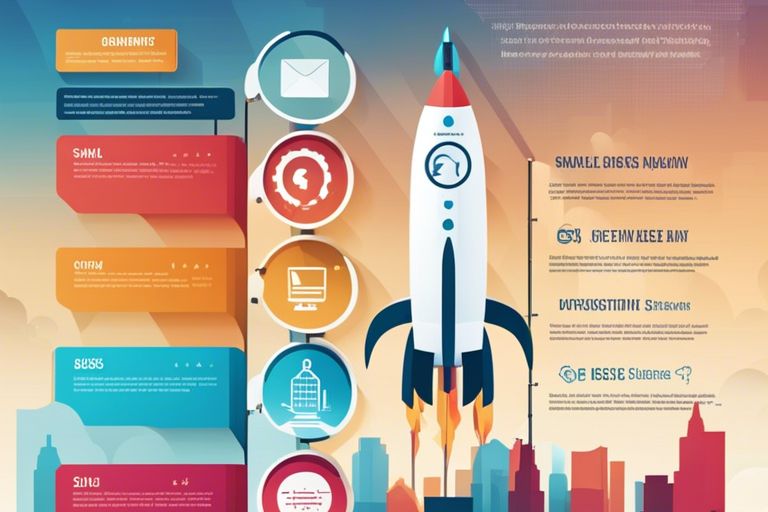Most small business owners today are discovering how AI marketing tools can revolutionize their approach to growth and sustainability. By leveraging advanced technologies, you can optimize your marketing strategies, enhance customer engagement, and streamline operations, ultimately leading to significant improvements in both profitability and efficiency. This blog post explores the transformative effects of AI on small businesses, empowering you with insights to harness these tools for assuring long-term success and environmental responsibility.
Overview of AI Marketing Tools
While traditional marketing methods have their place, the rise of AI marketing tools is radically transforming how small businesses approach their marketing strategies. These tools leverage data and automation to enhance decision-making processes, streamline operations, and ultimately drive growth. By adopting AI marketing tools, you can stay competitive in a rapidly evolving digital landscape.
Definition and Evolution of AI Marketing Tools
Evolution in the marketing realm has led to the integration of artificial intelligence (AI) into various tools that assist businesses in optimizing their marketing efforts. Initially, marketing tools relied heavily on manual input and basic data analytics. As technology advanced, the need for automated solutions became apparent, giving rise to AI-powered tools that are now capable of predictive analytics, customer segmentation, and personalization of marketing messages.
Today, AI marketing tools can analyze vast datasets and consumer behavior patterns, enabling you to make more informed decisions. The evolution from basic analytics to sophisticated machine learning algorithms marks a significant leap forward, allowing small businesses to deploy targeted campaigns quicker and with greater accuracy than ever before.
Types of AI Marketing Tools
Tools in the area of AI marketing can vary widely depending on their functionality, but they often share common characteristics that streamline operations and enhance effectiveness. Below is a concise overview of some of the most prevalent types:
| Type of Tool | Description |
| Predictive Analytics | Utilizes historical data to predict future trends. |
| Chatbots | Provides automated customer support and engagement. |
| Personalization Engines | Creates tailored experiences based on user behavior. |
| Social Media Management Tools | Automates social media posting and analytics. |
| Email Marketing Automation | Personalizes email campaigns based on user data. |
- Utilizing predictive analytics helps you anticipate customer needs.
- Implementing chatbots can free up your time for strategic tasks.
- Personalization engines enhance user experience, increasing engagement.
- Social media management tools simplify your outreach efforts.
- Email marketing automation boosts response rates and conversions.
With the increasing demand for effective marketing strategies, it’s imperative to familiarize yourself with the types of AI marketing tools available. Each tool serves a unique purpose that can cater to various aspects of your marketing needs. By leveraging these tools, you can harness the power of AI to engage your audience more effectively and ultimately foster business growth.
Importance of AI in Marketing
Overview of AI in marketing highlights its transformative potential for small businesses. The importance of AI lies in its ability to process vast quantities of data quickly and accurately, which gives you insights that were previously unattainable without extensive manpower and time. In a world where customer preferences change rapidly, AI helps you stay relevant by enabling you to adapt swiftly to new trends and consumer behaviors.
The significance of AI marketing tools also extends beyond mere analytics; they help you enhance customer interactions and personalize marketing efforts. By implementing AI, you can create targeted campaigns that resonate with your audience, improving engagement and retention rates. This not only supports your immediate marketing goals but also contributes to long-term sustainability and growth.
Tools that incorporate AI technology not only help you in data collection and analysis but also facilitate better decision-making processes. They can automate routine tasks, thereby allowing you to focus on larger strategic initiatives. This strategic approach enhances your overall marketing effectiveness, ultimately leading to improved customer satisfaction and increased sales.
- AI empowers you to optimize marketing strategies based on real-time data.
- Automated tools increase operational efficiency, reducing workload.
- Enhanced customer insights allow for targeted marketing efforts.
- AI-driven tools facilitate personalization, boosting engagement.
- Implementing AI fosters innovation in your marketing practices.
Benefits of AI Marketing Tools for Small Businesses
Many small business owners are beginning to recognize the transformative power of AI marketing tools. These innovative technologies offer a wide range of benefits that help your business grow and remain sustainable in today’s competitive landscape. From cost-effectiveness to enhanced customer engagement, these tools can streamline your marketing processes and provide you with a significant edge over competitors.
Cost-Effectiveness
Marketing your business can often stretch your budget thin. With AI marketing tools, you can enhance your return on investment (ROI) by automating various marketing tasks that would typically require a significant time and financial commitment. These tools minimize the need for large marketing teams, allowing you to allocate your resources more efficiently. As a result, you not only save on operational costs but also free up your team to focus on more strategic initiatives that can drive growth.
Moreover, by leveraging AI analytics, you can make smarter decisions on where to allocate your marketing budget. This refined targeting can result in better conversion rates and reduced waste, enabling you to achieve the same—if not a better—performance compared to a larger marketing investment. The integration of AI helps you to do more with less, making it an invaluable tool for any small business aiming for sustainable growth.
Enhanced Customer Engagement
Cost-effectiveness is crucial, but it’s equally important to foster strong relationships with your customers. AI marketing tools can significantly enhance customer engagement by providing personalized experiences. With the ability to analyze customer behavior and preferences, these tools enable you to segment your audience effectively and deliver tailored messages that resonate with them. This not only boosts customer satisfaction but also increases the likelihood of repeat business, turning first-time buyers into loyal advocates for your brand.
For instance, chatbots powered by AI can provide instant support to your customers, answering inquiries around the clock. They can resolve common issues and handle basic queries, allowing you to dedicate your human resources to more complex tasks. This immediate access to assistance not only enhances the customer experience but also builds trust in your brand, encouraging long-term loyalty.
Personalized Marketing Strategies
Personalized marketing strategies are one of the most exciting advancements brought forth by AI marketing tools. By analyzing customer data, these tools help you understand individual preferences, behaviors, and purchase history. With this information, you can craft customized marketing campaigns that effectively speak to the uniqueness of each customer. This level of personalization significantly increases engagement and conversion rates, as customers are more likely to engage with brands that understand their needs.
Engagement is further amplified when you implement targeted email marketing campaigns. By segmenting your audience based on their interests and shopping habits, you can send personalized content that boosts open rates and encourages customer interaction. This strategic approach leads to more meaningful connections with your audience, resulting in greater brand loyalty and increased sales over time.
Improved Data Analysis and Insights
Personalized marketing strategies rely heavily on the insights derived from data analysis. AI marketing tools excel at gathering and analyzing vast amounts of data, providing you with valuable insights into customer behavior and market trends. This information helps you identify which strategies are working and where adjustments are necessary, allowing you to pivot in real-time and optimize your campaigns for maximum impact. By embracing this data-driven approach, you can make informed decisions that lead to sustainable growth.
Another advantage of relying on AI for data analysis is the ability to forecast future trends based on historical data. This predictive capability allows you to anticipate customer needs and market shifts, positioning your business to adapt quickly and remain competitive. In an ever-changing marketplace, these insights are invaluable, giving you a significant advantage and ensuring the long-term sustainability of your business.
Challenges Small Businesses Face in Implementing AI Marketing
Now that we have explored the potential benefits of AI marketing tools, it’s important to examine the various challenges small businesses encounter when trying to implement these technologies. Each hurdle presents unique obstacles that can impede your growth and sustainability. Understanding these challenges is the first step toward navigating your path to successful AI integration.
Financial Barriers
Small businesses often operate under tight budgets, making financial barriers one of the most significant challenges to adopting AI marketing tools. While many AI solutions offer scalable pricing, the initial investment can still be daunting. You may need to allocate funds for tools, training, and maintenance, which can strain your already limited financial resources. This can lead to tough decisions about where to invest your money, hindering your desire to enhance your marketing capabilities through AI.
Additionally, ongoing costs for subscription services or upgrades can add financial strain, making it difficult for you to commit to long-term AI solutions. Balancing the need for advanced marketing technology with the realities of your budget can create hesitation, causing you to miss out on opportunities for growth that AI tools could provide.
Lack of Expertise
An often-overlooked challenge in implementing AI marketing tools is the lack of in-house expertise. You might find that your current team lacks the necessary training or knowledge to maximize the potential of these advanced technologies. Without proper understanding, it can be challenging to deploy AI effectively, leading to underwhelming results and frustrations for you and your team.
Challenges can arise when your staff must manage AI tools independently without adequate guidance or resources. If you lack the personnel skilled in data analysis, machine learning, or marketing automation, it becomes vital to seek training opportunities or outside help, which can further complicate your implementation process. Investing in the right education for your team is important for successfully leveraging AI.
Data Privacy Concerns
The era of digital marketing has ushered in numerous data privacy concerns that you must be cognizant of when integrating AI tools. As artificial intelligence relies heavily on data to deliver personalized experiences, the risk of compromising customer information increases. You need to ensure that your practices comply with regulations such as GDPR or CCPA, as failing to do so could result in hefty fines or damage to your reputation.
Moreover, customer trust plays a significant role in your business’s success. If they feel uncertain about how their data is being used, this could impact your relationship with them and deter future sales. Prioritizing ethical data management and transparent communication with your audience can help mitigate these concerns and create a safer environment for your AI initiatives.
Resistance to Change
The reality of any new technology adoption is that there will often be resistance to change. You may encounter hesitancy from your team when it comes to integrating AI marketing tools into your existing processes. Change can be uncomfortable, especially when it disrupts established routines, and some team members may feel threatened by the introduction of automation in their roles.
Additionally, your customers may also resist changes in how they interact with your brand. If your AI tools alter their experience, you must manage these transitions carefully to ensure that they feel valued and understood. That said, fostering a culture of openness and adaptability within your team can ease the transition and promote a clear understanding of how AI can enrich your business operations.
Resistance from both your team and customers to embrace new technologies can create a long-lasting impact if not addressed properly. To counter this, provide training, create a supportive environment, and emphasize the benefits AI tools can bring, ensuring everyone is on board with the changes ahead.
Best Practices for Small Businesses Using AI Tools
Keep in mind that the successful integration of AI marketing tools into your small business hinges on setting clear objectives. This means taking the time to define what you hope to achieve with these tools. Are you looking to increase website traffic, boost engagement on social media, or enhance customer segmentation? By having precise goals, you create a roadmap that guides your strategy and allows you to measure progress effectively. Moreover, clear objectives help in selecting the right AI tools that align with your business goals, ensuring that your investment yields meaningful returns.
The establishment of these objectives also provides a point of reference against which you can evaluate the tools’ performance. By regularly reviewing your goals and adjusting them as necessary, you can stay adaptive and responsive to changing market conditions and customer preferences. This iterative process fosters an environment where continual improvement becomes part of your marketing strategy, ultimately contributing to sustainable growth.
Integrating with Existing Marketing Strategies
On the path to unleashing the power of AI in your marketing efforts, it’s imperative to ensure that these tools complement your existing strategies. Rather than viewing AI as a standalone solution, consider how it integrates with your current marketing practices. For example, if you have a well-established social media marketing strategy, look for AI tools that can enhance content scheduling, audience targeting, or performance analytics. This synergy allows for a more cohesive approach that can amplify your overall marketing results.
Small businesses often have limited resources, so it’s crucial to leverage AI to enhance what you already do well. By integrating AI tools thoughtfully, you can create a more streamlined marketing process that maximizes efficiency and minimizes duplication of effort. Additionally, the insights gained from AI can inform your existing strategies, providing valuable data that enables more informed decision-making and a stronger connection with your target audience.
Continuous Learning and Adaptation
Marketing today is a dynamic landscape, and staying ahead requires that you engage in continuous learning and adaptation, especially when using AI tools. As the capabilities of artificial intelligence continue to evolve, your approaches should too. Regularly updating your knowledge about the latest AI trends and techniques will help you to utilize these tools to their fullest potential. Furthermore, encourage feedback from your team and customers, which can provide insights into areas for improvement and innovation.
Another imperative aspect of continuous learning involves monitoring the performance of your AI marketing tools. Metrics such as customer engagement rates, lead conversion numbers, and overall ROI should be regularly assessed. This data not only highlights what works but also indicates what needs to change. By fostering a culture of experimentation and responsive changes, you position your small business to thrive amidst the fast-paced evolution of digital marketing.
Developing a Customer-Centric Approach
Practices focused on a customer-centric approach are vital in leveraging AI tools to their fullest potential. AI can help you better understand your customers’ preferences and behaviors, allowing you to tailor your marketing strategies to meet their needs more effectively. By analyzing data from multiple touchpoints, these tools give you a comprehensive view of your audience, enabling you to devise personalized marketing campaigns that resonate with them. This enhanced understanding builds stronger relationships and encourages customer loyalty, leading to sustainable growth.
With a strong emphasis on customer-centricity, you can create AI-driven experiences that not only attract new customers but also keep existing ones engaged and satisfied. Making the customer experience a priority in your marketing strategy sets your small business apart and enhances your reputation in the marketplace, driving further success.
The Role of AI in Scaling Small Businesses
After you identify the potential of AI marketing tools, you can leverage them to scale your small business effectively. AI does not merely enhance the efficiency of operations; it radically transforms the way you engage with customers, manage resources, and strategize for growth. By integrating AI into your marketing efforts, you can harness data-driven insights to make better decisions, allowing your business to expand sustainably in a data-rich environment.
Automating Routine Marketing Tasks
An imperative benefit of AI marketing tools is their ability to automate routine marketing tasks. You may find yourself spending countless hours managing campaigns, tracking leads, and analyzing performance metrics. However, with AI tools, you can automate these processes, freeing up valuable time and resources, enabling you to focus on strategic initiatives that require your unique expertise. For instance, AI-driven platforms can handle social media posting, email marketing, and even customer feedback analysis seamlessly.
An additional advantage is that automation ensures consistency across your marketing channels. When AI manages the scheduling and posting of your content, you eliminate human error and keep your messaging coherent and timely. This reliability not only enhances your brand image but also maintains engagement, ensuring that you remain at the forefront of your customers’ minds.
Enhancing Market Reach
The implementation of AI marketing tools significantly enhances your market reach. By utilizing AI algorithms for audience targeting and segmentation, you can precisely focus your marketing efforts on the demographics that matter the most to your business. These tools can analyze vast amounts of data to identify potential customers who are most likely to engage with your brand, allowing you to craft tailored messages that resonate with their needs and preferences.
For instance, AI can help you run targeted advertising campaigns by gathering data from user interactions and preferences. This targeted approach not only optimizes your marketing budget but also increases the likelihood of converting leads into loyal customers. By leveraging AI’s advanced capabilities, you can explore new markets and demographic groups that you may not have considered before.
Improving Customer Retention and Loyalty
Loyalty programs powered by AI can significantly improve customer retention. By analyzing purchase history and customer behavior, AI tools can provide personalized recommendations and incentives tailored to individual preferences. This personalization fosters a deeper connection between your brand and your customers, encouraging them to return time and time again.
Furthermore, automated communication tools can keep you in regular contact with your customers, sending them reminders, special offers, and exclusive deals that resonate with their interests. By maintaining consistent engagement, you create a loyal customer base that feels valued and understood. This sense of belonging leads directly to increased retention rates.
Plus, implementing customer feedback loops through AI can help you understand the needs and expectations of your audience better. By actively responding to customer feedback and continually adjusting your strategies, you position your business as responsive and customer-centric, further solidifying loyalty.
Analyzing Market Trends for Strategic Decisions
Reach for new heights in your strategic planning by tapping into the analytical power of AI. AI marketing tools can help you sift through extensive market data, identifying patterns and trends that would otherwise go unnoticed. By understanding these insights, you can make informed decisions about your product offerings, pricing strategies, and marketing campaigns, leading to greater market penetration and growth.
Another advantage of using AI for market analysis is its ability to forecast future trends based on historical data. This capability empowers you to stay ahead of the competition and pivot your strategies proactively, rather than reactively. By anticipating market shifts and consumer behavior changes, you can position your business for sustained success and resilience in an ever-evolving marketplace.
Future Trends in AI Marketing for Small Businesses
Your business’s ability to thrive in a competitive marketplace will increasingly depend on your understanding and implementation of emerging AI marketing trends. As technology continues to advance, small businesses can harness these innovations to improve customer experiences, create personalized marketing strategies, and drive operational efficiencies. By staying ahead of these trends, you can ensure that your business remains relevant and poised for growth.
The Rise of Hyper-Personalization
Small businesses are increasingly realizing the power of hyper-personalization, which uses data-driven insights to tailor marketing efforts to individual customer preferences. This level of personalization goes beyond simply using a person’s name in an email; it involves creating targeted content, product recommendations, and promotional offers that resonate with your audience on a deeper level. As AI algorithms analyze customer behavior and purchasing patterns, you can deliver personalized experiences that foster loyalty and increase sales.
With hyper-personalization, you’ll have the opportunity to engage customers more effectively. By leveraging AI marketing tools, your business can quantify what resonates most with your audience, thereby tailoring communications that are relevant and timely. As a result, you will not only enhance customer satisfaction but also drive higher conversion rates and maximize your marketing ROI.
Advancements in Machine Learning
Learning about advancements in machine learning is crucial for small businesses looking to leverage AI effectively. These technologies allow for automation and insight generation at speeds and accuracies previously unimaginable. Machine learning algorithms can analyze vast amounts of data to uncover patterns and trends that inform marketing strategies. This means you can spend less time on manual analysis and more time focusing on creativity and customer engagement.
This evolution in machine learning enables small businesses to automate customer interactions, segment audiences more intelligently, and forecast market trends with greater accuracy. With predictive analytics powered by AI, you can make informed decisions that drive growth and sustainability while also enhancing your customer service capabilities.
The Growing Importance of Voice Search
Learning to adapt to voice search technology is becoming increasingly imperative for small businesses. As more consumers use virtual assistants like Siri, Alexa, and Google Assistant to find products and services, you need to optimize your marketing strategies for voice search queries. This shift means adopting conversational keywords and focusing on local SEO to ensure your business appears at the top of voice search results.
Future trends suggest that voice search will continue to reshape how consumers interact with brands. To stay relevant, you’ll need to think about how your customers phrase their queries and incorporate voice-friendly language into your content. This approach will not only enhance your online presence but also create an opportunity to connect with customers in a more seamless and accessible way.
Increasing Integration of Augmented Reality
Marketing through augmented reality (AR) is set to revolutionize the customer experience for small businesses. As AR technology becomes more accessible, you can create immersive experiences that allow customers to interact with your products in innovative ways. Whether through virtual try-ons, interactive brochures, or 3D advertisements, integrating AR into your marketing strategy will add a new layer of engagement that catches the eye and captivates your audience.
Voice-enabled AR applications provide a unique opportunity for you to enhance customer interactions. By allowing potential customers to visualize how your products fit into their lives, you can drive higher engagement and improve conversion rates. Staying ahead of the curve with AR integration will position your business as a forward-thinking brand that values customer experience and innovation.
Conclusion
Summing up, the integration of AI marketing tools into your small business strategy can significantly enhance your growth and sustainability. By harnessing the power of AI, you can achieve more targeted marketing, optimize your advertising budgets, and improve customer engagement. These technologies provide invaluable insights into consumer behavior, allowing you to tailor your offerings to meet the evolving needs of your audience. As you adapt these tools, you’ll likely find that your business becomes more efficient, competitive, and better positioned in the market.
Moreover, leveraging AI doesn’t just drive immediate results; it fosters long-term growth by enabling you to make data-driven decisions that keep pace with industry trends. Embracing AI marketing tools creates a foundation for sustainable business practices, ensuring that your company can thrive in an ever-changing digital landscape. By investing time and resources into understanding and applying these technologies, you position your small business to not only survive but also flourish in the face of challenges.





0 Comments